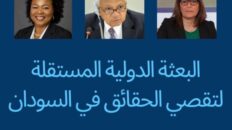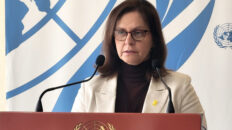11 December 2023
On 10 December 1948, a fledgling United Nations took a momentous step. In adopting the Universal Declaration of Human Rights, it laid down a promise of a world to be rebuilt—after the horrors of global war, the Holocaust, economic depression and the atomic bomb—on the firm foundations of our inherent rights.
While the community of States was fewer in number, the drafters of the Declaration came from every region and, in turn, drew on wisdom and experience across cultures and eras to set out our freedoms. The rights to live free from discrimination and from torture, the rights to education and to adequate food, and so much more.
The influence of the Declaration in the decades since has been remarkable, playing a unique role in strides forward on women’s equality; in progress on education and health; in the dismantling of apartheid in South Africa; and, indeed, in the victories of independence over colonial rule. The Declaration also inspired a glorious flourishing of civil society, itself hugely instrumental in both developing and advancing the rights agenda. This landmark document is also the point of origin for our rich tapestry of international human rights treaties, laws, instruments and mechanisms.
Despite so much progress, we are still far from the world envisaged by the Declaration’s framers and find ourselves contending with a determined pushback on rights. It would be a mistake, though, to dismiss the Declaration as a relic from a more benign and optimistic time. Its drafters emerged from an era ravaged by vicious cycles of destruction, terror and poverty, and in the face of a deepening ideological divide, remained undaunted in laying down a map towards a world more peaceful and just, in recognition of our shared humanity and our equal worth.

As we navigate these fractious and uncertain times, the Declaration’s enduring power lies in its promise of rights as solutions. Non-ideological and deeply rooted in the shared values of our “human family”, its principles can transcend geopolitical and social divides, drawing instead on our deepest reflexes—solidarity, empathy and connection. Comprehensive in its scope, it encourages solutions that are complementary—essential given the multitude of challenges we face. Its call for free and meaningful participation is the key to the broad engagement necessary for solutions to be both effective and legitimate.






